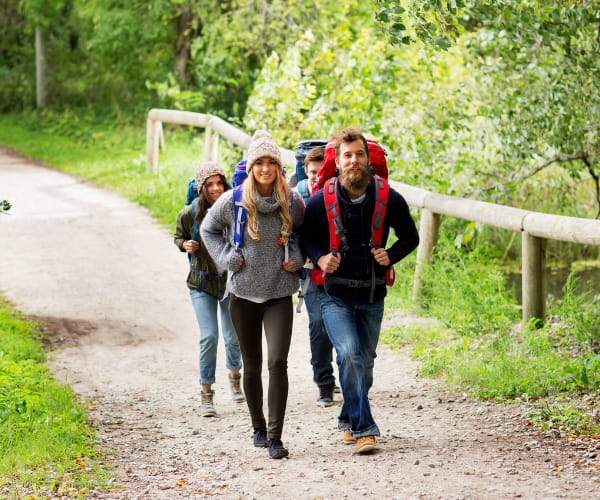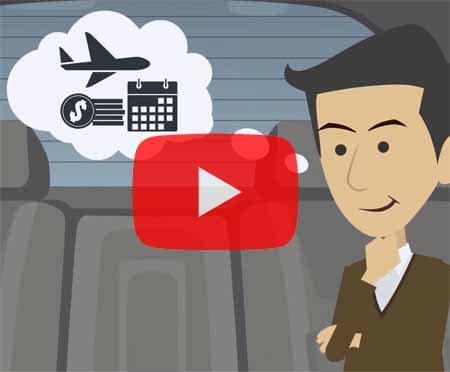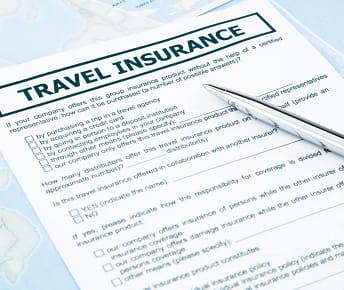Visitor Health Insurance for US Visitors
Are you planning to visit the USA? Then, you should be aware of medical expenses in the USA. Visitor Guard® provides affordable visitor medical insurance if you get sick or injured while visiting the United States.
Visitor Guard®'s visitor insurance plans provide reliable health insurance to US visitors, tourists, students on vacation, parents, exchange visitors, and au pairs.
We provide comprehensive travel insurance for visitors to the USA. We help you find customized insurance solutions specific to your travel schedule and needs, as well as provide you with advice on travel security and health concerns overseas.

Comprehensive Insurance Plans for USA
Safe Travel USA Comprehensive
$73 / mo For age 45 year with $50,000 plan and $250 deductible- Plan maximum limits ranging from $50,000 to $1 million
- Deductible options from $0 to $5000
- Coverage for Hospitalization, ER, Urgent Care, Dr. Office Visits, Prescription Drugs, Covid-19, Well Doctor Visit
- Coverage for 1 episode of Acute Onset of Pre-existing conditions
- Coverage from 5 days to 364 days
- Brochure
Patriot America Plus
$75 / mo For age 45 year with $50,000 plan and $250 deductible- Plan maximum limits ranging from $50,000 to $1 million
- Deductible options from $0 to $2,500
- Coverage for Hospitalization, ER, Urgent Care, Dr. Office Visits, Prescription Drugs, Covid-19
- Coverage for non-chronic Acute Onset of Pre-existing conditions
- Coverage from 5 days to 2 years
- Brochure
Venbrook Basic
$68 / mo For age 45 year with $50,000 plan and $250 deductible- Plan maximum limits ranging from $50,000 to $1000,000
- Deductible options from $0 to $5000
- Coverage for Hospitalization, ER, Urgent Care, Dr. Office Visits, Prescription Drugs, ADD
- Coverage from 5 days to 365 days
- Brochure
- Review Plan
Venbrook Premier
$74 / mo For age 45 years with $50,000 plan and $250 deductible- Plan maximum limits ranging from $50,000 to $1000,000
- Deductible options from $0 to $5000
- Coverage for Hospitalization, ER, Urgent Care, Dr. Office Visits, Prescription Drugs, Covid 19
- Coverage for Acute Onset of Pre-existing conditions up to age 69
- Coverage from 5 days to 364 days
- Brochure
- Review Plan
Patriot America
$73 / mo For age 45 year with $50,000 plan and $250 deductible- Plan maximum limits ranging from $50,000 to $1 million
- Deductible options from $0 to $2,500
- Coverage for Hospitalization, ER, Urgent Care, Dr. Office Visits, Prescription Drugs, Covid-19
- Coverage for non-chronic Acute Onset of Pre-existing conditions
- Coverage from 5 days to 2 years
- Brochure
Patriot Platinum
$167 / mo For age 45 year with $2M plan and $250 deductible- Plan maximum limits ranging from $1 million to $8 million
- Deductible options from $0 to $2,500
- Coverage for Hospitalization, ER, Urgent Care, Dr. Office Visits, Prescription Drugs, Covid-19
- Coverage for non-chronic Acute Onset of Pre-existing conditions
- Coverage from 5 days to 2 years
- Brochure
Limited Benefit Insurance Plans for USA
Visitors Care Insurance
$31 / mo For age 45 year with $50,000 plan and $100 deductible- Plan maximum limits ranging from $25,000 to $100,000
- Deductible options of $0, $50, $100 (varies by age)
- Coverage for Hospitalization, ER, Urgent Care, Dr. Office Visits, Prescription Drugs, Covid-19
- Coverage for non-chronic Acute Onset of Pre-existing conditions
- Coverage from 5 days to 2 years
- Brochure
Safe Travels Elite
$38 / mo For age 45 year with $50,000 plan and $0 deductible- Plan maximum limits ranging from $25,000 to $170,000
- Deductible options $0; For ages 79 to 89 yrs: $100, $200
- Coverage for Hospitalization, ER, Urgent Care, Dr. Office Visits, Prescription Drugs, Covid-19
- Coverage for 1 Acute Onset of Pre-existing conditions
- Coverage from 5 days to 364 days
- Brochure

Visitor Health Insurance for the USA
For A Healthier, Well Protected Travel
Have you ever been in a situation where you want to plan a vacation but can’t because of your health problems? If yes, then great. You have reached the right spot.
Traveling can be stressful enough without including uncertainty as to how you will find health coverage abroad. Whether you’re traveling in the USA or taking an international trip, Visitor Guard® is a leading health insurance provider that can help. Our plans offer the best visitor Visa health insurance to international visitors/tourists in the USA. You can take a look at our review section to get detailed insight into how happy our customers are. We leave no stone unturned to keep our customers content with our services and affordable policies.
Travel anywhere in the world with peace of mind and our health insurance plans to keep you safe.
Get Quote Now
What is Visitors Insurance?
Visitors insurance is a short-term medical insurance policy that travelers or visitors can purchase to travel to the United States. It offers protection from accidental injury or sickness that can arise during their stay in the host country. It is a mandated type of coverage for foreign nationals who come to the USA temporarily for any reason, business or personal.
This is a kind of medical insurance providing health coverage for foreigners, parents, or relatives arriving in the USA. This form of health coverage is purchased as a short-term plan, bestowing medical protection beyond national borders, but only for the duration of travel or stay outside the home country.

These plans also provide:
- Medical evacuation and repatriation benefits
- Accidental deaths and dismemberment
- Trip delays and cancellations, and
- Loss of luggage as part of the covered feature.
Types of Visitor Insurance in the USA
Limited Benefit Plans-
Limited plans or basic insurance plans are low-cost plans for travelers. An insured individual can be covered for medical expenses up to an amount on a pre-determined benefit table mentioned in the brochure, which one can review before purchasing.
Key aspects:
- Limited coverage as there are predefined sub-limits on all the benefits.
- Can go to any doctor or hospital as there is no PPO network, but payment will be made based on a pre-defined amount after you pay the deductible.
- It provides basic protection and may not be sufficient.
Comprehensive Benefit Plans-
With Comprehensive plans, once the deductible has been met, the plan pays a percentage for each eligible expense. This is called Co-insurance.
Based on the plan you opt for, the coinsurance can vary between 70–100% up to the first $5,000 on a policy, then 100% thereafter. These plans offer more benefits than basic plans and can provide coverage for a non-chronic acute onset of pre-existing conditions.
Key aspects:
- Better coverage and more protection
- Costly compared to the limited coverage plans.
- Based on the plan and company, benefits may differ. One should refer to the plan details for exact coverage.

Benefits of having insurance for US Visitor:
We ensure that you have access to health insurance coverage when you need it the most. We assist our customers in having a smooth and hassle-free travel experience.
- Individual Healthcare Cover pre and post-hospitalization expenses in case of any medical emergency.
- Pre-existing Disease Cover Get Insurance for pre existing conditions and lifetime diseases like diabetes, hypertension, or cancer covered.
- Covid-19 Coverage Cover all Covid-19 related medical and hospital bills while traveling abroad.
- Critical Illness or Surgery Plans Insure yourself to pay all your surgery and life-threatening illness treatment bills.
- Family Floater Policy Protect your entire family against health issues or medical assistance in the future.
Why Choose Visitor Guard® Insurance for USA?
Visitor Guard® is devoted to keeping you safe and healthy while you travel to the US with our plans for Visitor Health Insurance in the USA, specially designed to cater to all your specific requirements.
- Global Network we offer our specialized services to international travelers across the world.
- 24*7 Customer Support Get all your insurance-related doubts and queries solved in an instant with our round-the-clock customer assistance.
- Quick Claim Intimation We help you reimburse your claim quickly and effortlessly to get your medical coverage on time.
- Optimized Insurance Cost We offer the best insurance prices in the market for tension-free and safe international travel.
- Simple, Smooth Process Easy, quick and seamless insurance process to get the best health package deals.
Visitor Guard® #1 USA Travel Insurance Provider
Visitor Guard® has won the trust of travelers over the years with their effective and dependable plans for all international visitors traveling to the USA. Our cheap and best travel insurance plan safeguards people from all types of medical costs, including hospitalization, doctor visits, prescription drugs, repatriation, medical evacuation, and even acute onset of pre-existing conditions.
Visitors and travelers can fill up the form with a few clicks and apply for the plans. There are no strict rules and lengthy process of paperwork and medical checkups. They get to choose from the “limited benefit” and “comprehensive” plans according to their needs.
The process is simple, quick, and hassle-free. Submit the basic details like name, address, date of birth, and passport number. Verify the information instantly via mail. And you can enjoy the coverage from the next day onwards.

Affordable Medical Insurance for Visitors to USA
Where can I find Travel Insurance for USA?
Knowing the realities of high US medical costs, this is a common question we get from travelers. There are many types of plans, each with varying levels of coverage. Visitor Guard® has many policies for you to consider. We offer the best health insurance for visitors in USA for people traveling from India, China, and any country across the world.
You can always speak with one of our licensed agents if you have questions about the best health insurance for visitors to USA. All our licensed agents and claims administrators are based in the US. Claims are processed in conjunction with each providers’ office.
Difference Between Limited and Comprehensive Visitors Insurance Plans
Visitor Guard®'s offers 2 types of insurance plans for travelers: “Limited benefit” and “Comprehensive” plans.
Limited benefit plans have pre-defined limits on all the coverages. These types of plans are typically cheaper. With limited benefit plans, you will know your out-of-pocket maximum only after getting the bill.
Comprehensive plans provide much better coverage, though it is a little expensive. We recommend comprehensive plans to get your medical bills covered.
You can compare the plans in detail by simply filling up the form on top. These plans can be purchased according to your need, starting from 5 days to 364 days of duration. Most plans will give you coverages like medical evacuation and repatriation benefits- regardless of the type of the plan. Some of them even offer extensions.


Travel Insurance for USA Inclusions
All visitor visa insurance plans have basic coverage for medical illnesses and injuries. An illness or injury can be covered only if it happens after the policy is in effect.
These plans include several inpatient and outpatient benefits, like the coverages for hospitalization, urgent care, intensive care, and doctor visits.
Apart from these basic medical needs, coverages vary for the different plans. Many of them even cover the acute onset of pre-existing illnesses up to a certain age, like 70 years.
Some of them cover the cost of prescription drugs for new medical emergencies. Many of these travel insurances now cover Covid-19 like any other illness too.
The benefits also include medical evacuation and repatriation. You can opt for a plan that offers extended medical evacuation at no extra cost. The comprehensive plans can also include dental coverage for an accident, and the limited coverage of toothache.
Listed here the Travel Insurance for USA Cost
Visitor Age |
Plan Medical Limit | Price* |
|---|---|---|
55-59 |
Safe Travel Comprehensive
| $120 per month |
55-59 |
Safe Travel Comprehensive
| $151 per month |
How Much Does Travel Health Insurance Cost?
There is no one-size-fits-all cost for tourist health insurance plans. It differs for limited and comprehensive plans. The details like your age, the number of days you need coverage for, the deductible, and the policy maximum, determine the amount of your premium.
The premium for health insurance in USA Cost varies from $52-$136 (or more depending on the age) per month. The limited benefit plans are all cheaper than the comprehensive plans.
Many of these plans offer an extension or an upgrade like sports injuries. You can opt for them according to your special needs.
The quick procedure lets you start the coverage plan from the next day of application and confirmation. You can also choose a future date to initiate coverage while applying.
Medical emergencies are expensive in the USA, even for a minor injury. It can easily disrupt your whole budget for traveling. But opting for tourist health insurance can go a long way to bring you peace of mind.
Know more about Visitor Health Insurance USA Cost
Factors That Affect the Price of a US Visitors Travel Insurance
The amount of premium for your travel health insurance depends on the following factors-
1. Age of the applicant-
Age often becomes an indicator of how much a person is prone to medical emergencies. The premiums are usually higher for older travelers, as they may be at increased risk for health-related problems.
2. Area of coverage-
The location of your visit also impacts your premium. You might be charged a higher premium if you are traveling to the USA, compared to another part of the world.
3. Duration of travel-
Premiums are decided on a daily or monthly basis. The longer you stay, the higher your premium will be.
4. Coverage level-
You get to decide the amount of coverage and deductible for your premium. High coverage comes with a higher premium. But think carefully before choosing it, as you will have to pay the deductible if something unexpected were to happen.
Best Travel Insurance for Visitors to USA
Here we list the best medical Insurance for Visitors to USA. Purchase these plans from Visitor Guard® at an affordable price.
Travel Insurance for USA - Exclusions
The most common exclusions of travel health Insurance in the USA are-
- Losses due to pre-existing conditions
- Travel costs if you are visiting the USA for medical treatment
- Losses due to war
- Extremely high-risk sports like sky-diving, scuba diving, bungee jumping
- Mental, psychological, and nervous disorders
- Intentionally harming themselves physically, like attempting suicide
- Venereal disease, AIDS virus, pregnancy, and abortion
- Treatment caused by alcohol or drug intoxication
Learn More About Travel Insurance for USA
- Review tips for traveling safe and finding Insurance For Travelers With Medical Conditions. This post explains what is typically covered and what is excluded from these plans.
- Practical tips for obtaining Visitor Medical Insurance Covering Diabetes and high blood sugar level conditions. This post contains great advice for diabetics, including best practices for protecting themselves while traveling.
- Learn what is covered by Visitor’s Health Insurance for High Blood Pressure Conditions. By planning ahead, individuals with high blood pressure can protect themselves from high medical expenses.
- A detailed and relevant post about Visitors Insurance For Parents Visiting USA provides valuable insight into what is covered and what is excluded from visitor's health insurance.
Travel Insurance for Visitors to USA - FAQ
Individuals or groups who are traveling outside their home country or country of citizenship can consider these insurance plans- regardless of whether they are on tourist visas, for business, immigration, or as international students.
Medical tourism refers to individuals traveling abroad to get medical treatment. Typically, individuals from less-developed countries travel to medical centers in developed countries for treatment that could not be provided in their home country. Individuals who have long waiting periods for a planned surgery also fall back on medical tourism which sometimes is cheaper and faster at a medical facility in another country. Visitor Travel insurance can provide emergency medical coverage for injuries and illnesses arising after the policy is in effect and which are not linked to a pre-existing condition. If you suffer an unexpected illness or injury on your journey, the policy can cover the cost of ambulance transportation, medical treatment, hospital accommodation, medical evacuation, and repatriation if required.
However, these plans will not cover medical tourism.
Yes, non-US citizens can buy health insurance. The health insurance plans of Visitor Guard® offer coverage outside your residence or country of citizenship. Based on your destination country, Non-US citizens along with US citizens can get a quote to compare the various plans available and select a plan that meets their requirements.
You can buy the foreigners travel insurance plans before or after the start of your trip. The duration of these plans can be anywhere between five days to three years. Most of our foreigners’ health insurance plans include direct payments to certain hospitals and doctors. So you can even enjoy a cashless transaction while visiting a care center in the US. Foreigners can buy these affordable plans based on the amount of coverage they prefer. These plans cover unexpected medical costs if some sudden accidents or illnesses occur.
Simply answer the questions above and get a quote to review the various options available and then purchase a travel medical insurance online. If you have any doubt, contact our agents and claims administrators.
As a visitor to the US, it is not mandatory to buy travel insurance. However, with high medical costs in the US, you can be at risk of losing an enormous amount of money even for a minor injury. To avoid any unexpected financial burden due to your medical conditions, it would be best to buy a visitor’s medical insurance.
The USA is one of the most expensive areas in the world in terms of medical treatment. You might have to pay an extensive amount just for consultation and minor or routine treatment. Illnesses and injuries rarely come with a warning. If you want to avoid any unfavorable situations, it is best for you to get a good plan that meets all your requirements before you visit the US.
There are various options available for visitors to choose from. Learn the difference between a fixed benefit and a comprehensive plan and how these plans meet your requirements. Comprehensive plans like Safe Travel USA Comprehensive, Patriot America Plus, Atlas America, and fixed benefits plans like Visitors Care are some of the popular plans to compare.
There is no one-size-fits-all when it comes to medical insurance. Go through the coverages of these plans and choose the one that covers all your needs and preferences.
Most travel insurance plans provide coverage for medical emergencies (doctor visits, hospitalization, surgery, intensive care, as well as new prescription drugs) up to the pre-determined limit, along with evacuation, repatriation, trip cancelation, lost luggage, and even trip-interruption benefits. Depending on the plan, trip cancelation and preexisting conditions may be covered.
No, there is no age restriction in travel insurance policies, these are for foreigners to the US up to the age of 99 years. However, the amount of coverage you get through the policy might vary according to your age. And the coverage of acute onset of pre-existing conditions are valid up to a certain age, like 70 years.
Travel insurance covers the medical illnesses and injuries that occur after the effective date of the policy. These travel plans provide inpatient as well as outpatient benefits including coverage for hospitalization, intensive care, urgent care or office visits and even prescription drugs. Many travel insurance plans include coverage for an acute onset of a preexisting condition. Repatriation and medical evacuation are mostly included there, though some plans offer an option to increase the amount of medical evacuation cost limits at an extra cost. You can decide the policy maximum or the upper limit of the benefit according to your preference and budget.
Whether you are a first-time international traveler or a seasoned traveler who has visited the USA many times before, there’s always a chance of an unexpected travel setback due to a medical illness or injury. In these cases, Travel Insurance for USA can serve you as a financial pillow for medical coverage along with travel assistance if needed. You can benefit from health insurance if you are a USA tourist or parent visiting family in the US, an international student on F or J visa, or traveling for business.
It depends on the travel policy, but you can opt for a policy that covers trip cancelation if you want. Plans like the “Safe Travel USA Trip Protection” can provide you coverage for trip cancelation. People eligible for this plan have to be non-US citizens traveling to the USA and other foreign countries from their home countries, and they have to be below the age of 80 years. Safe Travel USA Trip Protection policy provides coverage for trip cancellation, trip-interruption, emergency medical, and post-departure travel protection. It includes a pre-existing medical condition waiver. While applying, you can even opt for the optional upgrades like emergency accident and sickness medical expenses, AD&D, athletic sports coverage, and home country/follow-me-home coverage. It Provides complete trip protection for the cancellation of trip costs for up to a maximum of $25,000, and the trip-interruption benefit covers 150% of the trip for up to a maximum of $37,500. The policy covers up to $1,000,000 in primary emergency medical coverage.
It is always recommended to opt for insurance from the USA rather than from India or other countries while visiting. The hospitals and care centers are familiar with the network and insurance providers of the USA, and they can easily send the bills directly to the insurance company. So you can enjoy a mostly cashless payment procedure, and hence less hassle.
The US insurance companies are more familiar with the medical cost and needs, so they design the policies for the maximum benefit of the visitors from India to the US. Be it for younger or older travelers, the US insurance companies have a wide range and choice of policies for all kinds of needs and preferences.
Visitor’s insurance is not under the Affordable Care Act (ACA) compliant. And benefits like preventive care, pre-existing conditions, and maternity coverage are typically not included in this kind of insurance. However, there are plans that provide some benefits for the acute onset of certain pre-existing conditions, and cover the complications of pregnancy in the first 26 weeks. Review your certificates carefully or talk to our agent to clarify all your doubts.
Most travel insurance to the US does not cover pre-existing conditions. But, there are also many health insurance policies that cover the acute onset of pre-existing conditions like high blood pressure, diabetes, heart attack etc. Clarify with your agent beforehand to ensure you get the coverage for the condition you are looking for.









